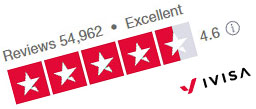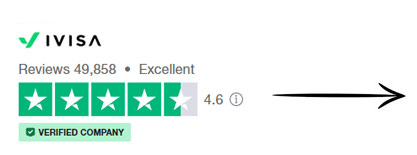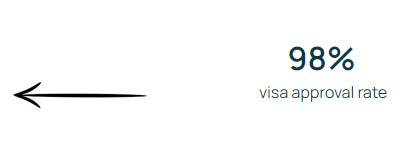France: Chinese citizens need a visa?
If you're planning to travel to France from China, you may be wondering whether you need a visa and how to go about getting one.
 Fast: Simplified, efficient process.
Fast: Simplified, efficient process.
 Security: information is protected.
Security: information is protected.
 Reliability: 98% approval rate.
Reliability: 98% approval rate.
 Assistance: 24/7 customer support.
Assistance: 24/7 customer support.


The Schengen visa is an essential document for travel to France and the 25 other member countries of the Schengen agreement. It allows travellers to move freely within this area without going through border controls. However, Chinese citizens are required to obtain a Schengen visa before travelling to France. On this page, we will provide you with clear and precise information on the Schengen visa requirements for travelling to France. We will also go into detail about the procedure for applying for this visa. Whether you are a tourist, a student, a businessman or a traveller in any other category, we will guide you through the necessary steps to obtain your Schengen visa and make your trip to France a trouble-free one.


When it comes to international travel, the situation varies for each nationality. For Chinese citizens wishing to visit France, obtaining a visa is an essential requirement.
France is part of the Schengen area, a group of 26 European nations that have abolished their internal borders to facilitate the movement of people. To enter France, Chinese citizens must obtain a Schengen visa.
This special document grants access to all member states of the Schengen area for a maximum period of 90 days over six months for tourist or professional stays.
Applying for a Schengen visa for France from China can be done online via the official website or a service provider website. Here are the detailed steps for applying for a Schengen visa online:
The length of validity of a Schengen visa for Chinese citizens depends mainly on the type of visa applied for. The Schengen visa can be a multiple-entry or a single-entry visa, and its duration fluctuates between 6 months and 5 years, depending on the specific needs of the traveller.
It is crucial for all applicants that the actual length of stay does not exceed the deadline indicated on the visa. If they do, they could face severe penalties, including a future ban on travelling within the Schengen area.
For Chinese citizens wishing to travel to France, a series of documents are required when applying for a Schengen visa. These include a valid passport, with at least two blank pages and no more than 10 years old when the application is submitted.
Two recent passport photos are also required, as well as a proof of accommodation or a hotel reservation for the duration of the stay. Proof of financial means to cover the stay in France is required, usually in the form of a bank statement.
Depending on the applicant's professional status, proof of employment or a school certificate may be required. Proof of international travel insurance covering medical expenses up to a minimum of €30,000 is also required.
The full list of documents required may vary slightly depending on the specific circumstances. Chinese citizens planning a trip to France are therefore advised to check this list on the official website of the French consulate in their country before taking any action.
Chinese citizens wishing to travel to France may have their visa application rejected for various reasons. The most common reasons for refusal are often related to the inadequacy or non-conformity of the documents submitted. It is imperative that all the information submitted is accurate and complete, otherwise the applicant may be rejected.
One such reason is the absence of valid travel insurance covering the entire Schengen territory. This is a prerequisite for obtaining a Schengen France visa. Another frequent reason for rejection concerns the reason for staying in France, which must be clearly detailed when the application is submitted.
A visa application may be rejected if the applicant does not have sufficient financial means to cover the costs of the stay. The French consulate must be satisfied that the applicant has the necessary funds for the duration of the planned stay.
If a person has previously breached Schengen visa rules or behaved improperly on a previous trip, this could result in a new application being rejected.
Safety in France for Chinese citizens is a subject that attracts special attention. Generally speaking, France is renowned for its peace and respect for human rights, contributing to an appropriate level of safety for foreigners, including those from China.
Nevertheless, as in any country in the world, certain risks and challenges exist. Occasional incidents of assault or robbery are common in certain densely populated urban areas or areas frequented by tourists. Chinese citizens are advised to be particularly vigilant when travelling in these areas.
In addition, the language barrier can occasionally pose a problem. Despite the fact that English is widely used in France, particularly in Paris and other major tourist cities, it would be useful for every Chinese traveller to master a few common phrases in French to enrich their overall experience.
Although it is not possible to guarantee total safety when travelling internationally - caution is always advisable - France generally proves to be a safe place for foreign visitors. Nevertheless, this is a crucial factor to consider before departing for this country famous for its deep culture and captivating history.
Find out if your question has been answered in the list below
Whether you need a Schengen visa to travel to France depends on your nationality. Citizens must obtain a visa before travelling. It is essential to check the specific Schengen visa requirements according to your nationality by referring to the French consulate or embassy in your country.
To apply for a Schengen visa for France from China, you need to follow certain steps. Firstly, gather all the required documents, such as the application form, a valid passport, passport photos, proof of flight and accommodation bookings, travel insurance, etc. Then go to the website of an approved service provider and fill in the online application form. Then make an appointment to submit your application and attend the consular interview.
Processing times for Schengen visa applications may vary depending on the French consulate or embassy and the time of year. As a general rule, the usual processing time is around 15 working days from the time the application is submitted. However, it is advisable to submit your Schengen visa application several weeks in advance to allow for any delays.